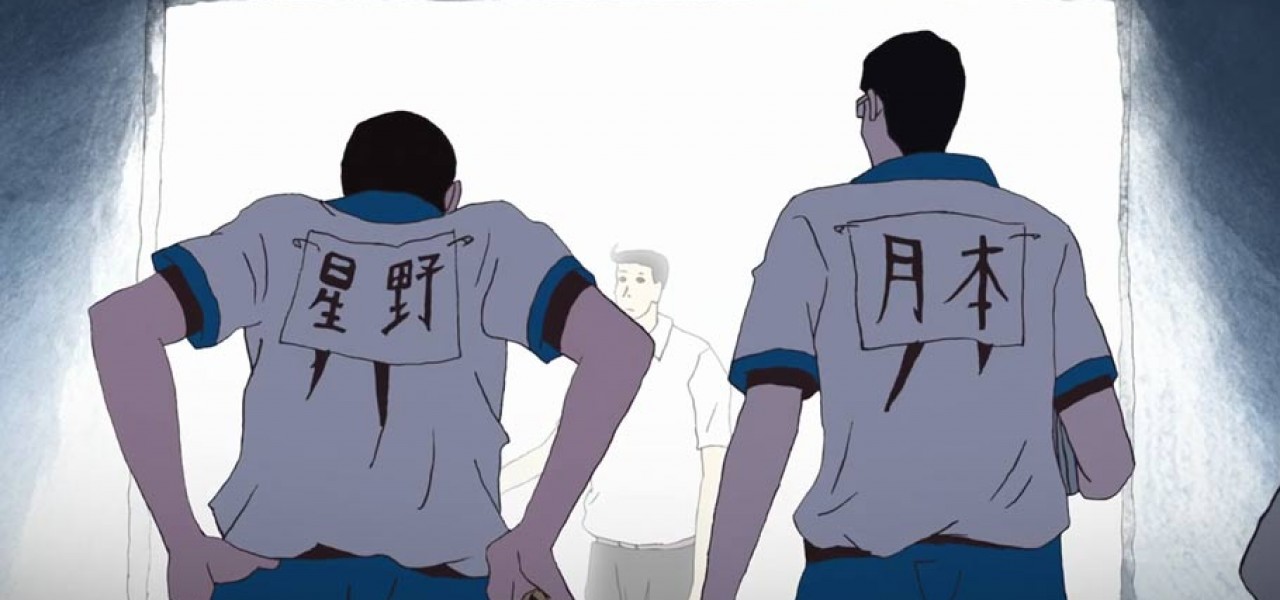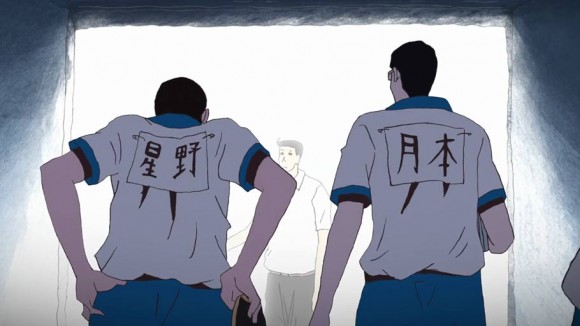

‘Ping Pong’ Recap: ‘Blood Tastes Like Iron’ (Ep. 11)

Dragon’s surprise defeat has the social media abuzz as Smile and Peco head towards the long-heralded showdown in the series finale.
Masaaki Yuasa’s fourth TV show wraps up in a fairly satisfying way with a briskly paced and nicely animated climax that brings emotional closure to the story with a cathartic showdown and thread-tying coda. As usual, spoilers ahead.
Someone had to come out on top, and it makes sense in retrospect that it would be Peco, who is the one who wanted to become a star to begin with. Smile had to step off Peco’s coattails and become his own person, and he did it after putting his old friend back on top of his game. Smile did the honorable thing by not going easy on Peco due to his knee injury, and the two had the match of a lifetime as a result.
Blood and its iron-like taste are the guiding metaphor of the episode: Blood not as the symbol of death and injury but of life and striving. Peco is revealed, as suspected, to be the one who freed Smile from the locker. Just as Peco injured his knee saving Smile from bullies as a kid, Smile in turn injures his own knee, in a beautifully animated sequence, leaping like a madman to catch Peco’s lob. His invincible robot persona came then not from the taunts of his schoolmates but from this life lesson taught by Peco, which Smile imaginatively embellished into an alter-ego to help him get through stressful situations. It was nice to see him smile for the first time as he tasted the iron in his own blood.
A beautiful musical interlude riffs on the blood theme with the classic children’s song “Raise Your Hand to the Sun” written by Takashi Yanase and scored by Taku Izumi. I know the song from the underrated Sanrio masterpiece Little Jumbo (1977) (watch), but the song actually dates back to a 1963 Minna no Uta music video, and has been popular ever since. Its message is simple and life-affirming: the blood running through our veins when we look at hour hands in front of the sun tells us we’re all alive. It accompanies a touching montage of the various protagonists growing up playing ping pong framed from the same angle, showing them gradually getting bigger and better, ping pong being just a mirror reflecting their life.
The episode rightly skips from the middle of the match to the coda many years later showing how the characters developed afterwards. The results are only indicated without fanfare when we zoom in on a victory photo showing Smile standing in first place, Peco in second and Ryuichi in third. The photo is dated June 20, 2014, the day after the actual broadcast, placing the action squarely in our time. The tweeting and SMSing at the beginning of the episode serve that purpose too.

Showing the win in gory detail would have been beside the point. The point was made when Smile smiled. Life never turns out the way you expected, and the coda shows this. Ryuichi went on to become a middling player; Kong got back into the game and came out ahead of Ryuichi. Crazy Sakuma turned into a family man, Yurie into a fashion designer in Paris, and Smile into an elementary school teacher. Peco, meanwhile, did what few of us can do: he stuck to the path and achieved his childhood dream of stardom in his chosen field. And in the most amusing turn, Egami the world traveler, the sporadic appearer, the one who never touched a ping pong ball throughout the whole show after his defeat at the hands of Smile, came back only to realize his true love had been ping pong all along.
In the end Masaaki Yuasa did indeed achieve the unlikely feat of storyboarding every episode, as if directing the show weren’t enough. He also directed the bookend episodes. The show is technically a landmark in that sense, and not one likely to be repeated any time soon, as few would probably be up to such a task. Remarkable is that Yuasa managed to cram so much thought into every scene of the show, when he must have needed to bang a storyboard out once a week. Every scene was filled with thoughtful presentation, cross-cuts referencing an early memory or another character’s experience that gave a scene more meaning, all while maintaining strong forward momentum and rhythm, and bringing the characters’ various threads gradually together over the course of eleven episodes. And creating interesting choreography for the ping pong matches, while staying faithful to the aesthetic of the original manga. Of course, he was working from source material, but I don’t doubt he more than put his stamp on the show—not only in terms of the unique visuals but the story, too, which he embellished to give the characters more depth.

Kudos should go to the entire staff for creating a beautiful and moving show whose characters came alive and resonated on a grueling schedule of one episode a week. Let that sink in. They had one week to produce each episode. Even Astro Boy took a month per episode to produce. Art director Aymeric Kevin in particular deserves to be singled out for his beautiful background work on the show, which I haven’t praised as much as it deserves. The oft-seen image of the dojo, the birds-eye view of the town, the steep staircases in the dappled shade leading down to the beach where Egami waded and Peco swam—just a few of the remarkable images he created that defined the environs of the characters and made them feel like living beings grounded in a locale.
The animators, too, fought valiantly. I wish I knew in more specific detail who did what, but there were a few standout scenes in each episode, and the regular names who appear throughout the show are presumably to thank for those. Yasunori Miyazawa deserves to be singled out for special praise. He was the animation hero of the show in my eyes. Every one of his appearances in the credits signaled a wonderful sequence of deranged but thrilling animation. The finale was no exception. He put in his best work after the memorable battle between Kong and Ryuichi in episode 4. Smile dashes up from where he had crashed into the fence, and Smile and Peco battle it out in stark black-and-white while the ping pong table oscillates erratically in the middle of the screen. It’s a sequence I could re-watch over and over and still be thrilled. Yasunori Miyazawa is a rare bird. His animation is hard to pin down and analyze. It’s too instinctive and off-the-cuff for that. There’s just something about it that thrills—it’s that magical thing called genius. Miyazawa was also given pride of place as the animator of the last shot of the series.
Back in the day, when animation teams were much smaller, drawing demands not as strict, and animators more free to be playful with the drawings, crowd scenes were something to look forward to. The crowds of Urusei Yatsura are full of crazy characters, but even in many other anime the crowd scenes offer the animators the opportunity to come up with a variety of playful ideas to fill out the crowd. Ping Pong’s rafters were always pleasing to see because the people were drawn in the idiosyncratic hand of the animator. Occasionally there were playful touches thrown in, like the gorilla in this episode. Although the show was rough around the edges due to the short schedule and the need to draw things quickly, drawing quickly and not being able to go back and correct everything also meant that animator personality came through more than typical.
Taiyo Matsumoto receives special thanks in the finale in the animator credit section. Some of the drawings in the episode immediately seemed to me to be drawn by him, so perhaps he pitched in and drew some of the last episode’s drawings. Of course, he was consulted by Yuasa heavily throughout the show in terms of how to fill out the story, and pitched some things that he hadn’t been able to do in the manga, so the nice thing about this adaptation is that it’s probably very true to Matsumoto’s vision of the characters.
Ping Pong Episode 11: Blood Tastes Like Iron
| Storyboard: Script: Series Structure: Episode Director: |
Masaaki Yuasa | |
| Animation Director: | Nobutake Ito | Naoyuki Asano |
| Sayaka Toda | Shoko Nishigaki | |
| Special Thanks: | Taiyo Matsumoto | |
| Key Animation: | Izumi Murakami | Yasunori Miyazawa |
| Kanchi Suzuki | Maiko Kobayashi | |
| Etsuko Kono | Natsuko Shimizu | |
| Kenichi Ishimaru | Yoshiko Okuda | |
| Mai Toda | Yukie Yamamoto | |
| Saori Koike | Tomomi Kawazuma | |
| Sai Yamaguchi | Toshiyuki Anzai | |
| Ryota Ito | Tetsuro Kaku | |
| Sayaka Toda | Shoko Nishigaki |
